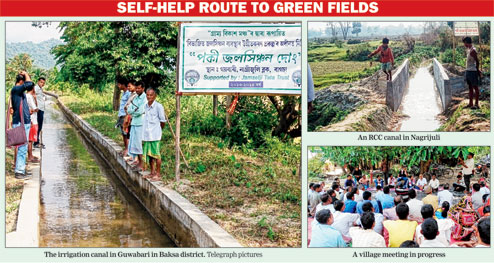 |
Nagrijuli, Nov. 17: Villagers of Nagrijuli in Assam’s Baksa district have set an example by creating an irrigation system on their own in the water-starved region along the India-Bhutan border.
People in more than 10 villages in the area have come together and, instead of waiting for government help that was nowhere in sight, constructed a 12km main concrete canal and various sub-canals to divert water from the Oronga river to the agricultural fields.
“Since we can’t access groundwater due to the hard, rocky terrain and our area is largely untouched by government schemes, water scarcity is a big problem here, particularly during winter. But the construction of the dong (canal) by the community with the help of local NGO Gramya Vikash Mancha has provided the much-needed respite to the farmers,” said Ratiranjan Mandal, a resident of Guwabari village under Nagrijuli development block.
Guwabari village is nearly 120km from Guwahati.
The villagers have not only painstakingly constructed the canal but also devised a mechanism to divide the water equally among themselves by regulating the flow with the help of embankments and sluice gates.
Mandal said with the help of the canal and its sub-canals around 12,000 bighas of agricultural land, mostly paddy fields, are now being irrigated.
He said they had started construction of the canal in January this year and it was completed in March.
NGO president Prithi Bhusan Deka said they provided the construction materials to the villagers under their project titled “promotion of diversion-based irrigation” funded by Jamsetji Tata Trust.
“We have been greatly benefited by this canal, which will help the farmers increase their agricultural yield. We need more such irrigation facilities to usher in an agricultural revolution in the backward and remote area,” said Dharma Narayan Das, a small tea grower. He said there are more than 70 small tea growers and around 200 hectares of land under tea cultivation in the Nagrijuli area.
Das, who gave up his job in a pharmaceutical company to take up tea cultivation in his native village in 2008, said there is potential for tea cultivation in the area, provided irrigation facilities are improved.
He rued the lack of effort by the state government to develop the area. “Due to absence of basic facilities such as schools, hospitals, electricity, roads, the area is underdeveloped and lacks livelihood opportunities, as a result of which a large number of youths from the area have migrated to other places in search of employment,” Das said. The area, which was once a hotbed of militancy, had seen major army action during Operation All Clear against Ulfa in 2003.
“If the government wants to prevent youths from joining militant groups then they should properly implement development schemes in such backward and remote areas. The government needs to ensure that development schemes do not remain on papers only,” Girish Basumatary, a villager, said. Tilak Bahadur Kharka Chhetri, a resident of Mahendra Nagar, said there are only two teachers against 250 students in Gopinath Bordoloi ME School in the area.
“To overcome the shortage of teachers, the people had to hire three additional teachers by paying them Rs 3,000 per month from their own pockets, which itself speaks in volume about the education scenario in the area,” Chhetri said.










